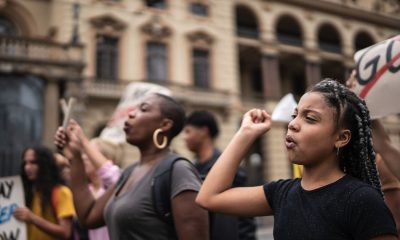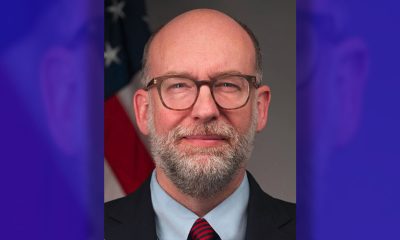#NNPA BlackPress
Legacy Keepers Bridge Gap Between Black Panthers and BLM

The original Black Panther Party (1966-1982) left behind a legacy that is often side-lined by the imagery of Black men and women carrying guns in self-defense while wearing black berets and leather jackets. The legacy had been stifled as many party members became political prisoners, and without knowing it at the time, targets of an FBI program called COINTELPRO meant to destroy the party using various deceptive tactics.
With programs like free breakfast and lunch for school children, free health clinics and educational institutions, the BPP created over 60 documented community programs they called survival programs. Many of these programs have become a blueprint for activists today. The BPP created these programs acknowledging that the government was not going to come to communities and do the work of improving them, so the communities had to organize and build structural programs for themselves.
Founded in Oakland, with branches eventually spreading all over the U.S., the BPP believed the only way to create economic stability and self-sufficiency in Black communities was through a combined effort of the people who are from and part of their communities. That is where the term they often use, “All Power to the People,” comes from.
After the death of George Floyd sparked historical nationwide protests under the banner of Black Lives Matter, activists eagerly called original BPP member Saturu Ned looking for advice on how to maneuver what they saw as a modern-day revolution. Formerly known as James Mott, Ned became a BPP member in 1968 and was a member of the BPP’s Lumpen Band. He also taught at Oakland Community School, an award-winning school created by the BPP.
Amin Cooley was one of those activists who called Ned feeling frustrated and angry after watching the video of George Floyd’s death by police officers in Minneapolis, Minnesota. Cooley is from Oakland and was raised in a time when crack cocaine dominated the streets. He saw how it affected his community. He looked up to the BPP legacy but admits he did not know too much about its history.
When he was young, he went to see ‘Panther’ a film directed and written by Mario Van Peebles. “And this was like, a secret premiere, and I was like ‘wow, this is the first time I actually get to meet some Black Panthers,’” Cooley said. When he attended the premier he was not able to build up the nerve to talk to the original members who were present, but he remembered the movie making a big impression on him.
“It was about the community and I wanted to be a part of that. And I’ve always looked up to them my whole life. And when George Lloyd was murdered by the police, I cried, I cried really hard,” Cooley said. After sleeping all day he said he woke up the next day, “with a fire in my heart and my soul.”
Cooley reached out to a friend who knew Ned. Cooley said he told his friend, “We got to see the Black Panther Party back or at least the programs and the ideology because they have the blueprint in their head.”
Cooley connected with Ned, and they both became co-founders of B.P.P. Legacy Keepers. Under one non-profit with contributions being tax-deductible through the Pledge Group Foundation 501(c)3, B.P.P., Legacy Keepers is seeking to build a network of “legacy keepers” who are already doing community work as well as educate anyone who wants to bridge the gap of knowledge from the time of the BPP to the present.
Being an original Black Panther Party member is not required to be a legacy keeper. Anyone who is doing work similar to that of the original BPP like providing food, healthcare, housing, and legal support would be considered a legacy keeper of the original movement.
Calling for national access-for-all healthcare, advocating for affordable housing, working towards changing the justice system, all of these current-day political discussions fall in line with the BPP 10-point program.
The problem, Ned explained, is that today there is no clear leadership or messaging. He calls the current cycle of video recordings of Black people being killed by police followed up with marches and a hashtag to donate money a “death march” that has no clear vision or accountability. Marching has the purpose of raising attention to a problem, he said, but there is work to be done beyond that.
Legacy Keepers instructs their network users in the methodology of identifying what’s going on in communities and figuring out how to resolve community issues and problems. The problems are intertwined, so working on the idea of police reform or defunding the police would have to collate with other issues in communities, like healthcare, mental health, job security, housing, and food security.
Instruction is based on the BPP legacy using modern technology like classes over Zoom and studying how video phones and social media can be used for effective strategies.
With Ned’s wife, Dr. Zafirah Ned, other instructors available to teach these classes include Katherine Campbell, (Auntie) Francis Moore, and Professor Steve McCutchen. The B.P.P. Legacy Keepers network includes hundreds of individuals, organizations and businesses all over the country.
Cooley represents the younger generation who is learning under the guidance of Ned and will be an instructor as well. Saturu Ned has already done classes on Zoom to universities like Fresno State.
“We are giving classes to policymakers on a national basis, giving Zoom presentations to individuals who want to see how they can actually increase the effectiveness of their organizations,” Ned said. “with other organizations…switching from the concept of just Black Lives Matter, first the historical classes, and then the ideology. We’ll separate myths from fact.” The purpose Ned said, is to start conversations into specific plans and to turn plans into action.
“You’re talking about defunding the police. Every time we hear that, do we not ask where’s your plan?” Ned said. So far, he said he has not heard a concept with a detailed plan that could feasibly be turned into action, and that is a problem that organizing and educating current day legacy keepers can solve.
For more information go to bpplegacykeepers.com.

#NNPA BlackPress
LIHEAP Funds Released After Weeks of Delay as States and the District Rush to Protect Households from the Cold
BLACKPRESSUSA NEWSWIRE — The federal government has released $3.6 billion in home heating assistance after a delay that left states preparing for the start of winter without the program’s annual funding.

By Stacy M. Brown
Black Press USA Senior National Correspondent
The federal government has released $3.6 billion in home heating assistance after a delay that left states preparing for the start of winter without the program’s annual funding. The Low-Income Home Energy Assistance Program, known as LIHEAP, helps eligible households pay heating and cooling bills. The release follows a shutdown that stretched 43 days and pushed agencies across the country to warn families of possible disruptions.
State officials in Minnesota, Kansas, New York, and Pennsylvania had already issued alerts that the delay could slow the processing of applications or force families to wait until December for help. In Pennsylvania, more than 300,000 households depend on the program each year. Minnesota officials noted that older adults, young children, and people with disabilities face the highest risk as temperatures fall.
The delay also raised concerns among advocates who track household debt tied to rising utility costs. National Energy Assistance Directors Association Executive Director Mark Wolfe said the funds were “essential and long overdue” and added that high arrearages and increased energy prices have strained families seeking help.
Some states faced additional pressure when other services were affected by the shutdown. According to data reviewed by national energy advocates, roughly 68 percent of LIHEAP households also receive nutrition assistance, and the freeze in multiple programs increased the financial burden on low-income residents. Wolfe said families were placed in “an even more precarious situation than usual” as the shutdown stretched into November.
In Maryland, lawmakers urged the Trump administration to release funds after the state recorded its first cold-related death of the season. The Maryland Department of Health reported that a man in his 30s was found outdoors in Frederick County when temperatures dropped. Last winter, the state documented 75 cold-related deaths, the highest number in five years. Rep Kweisi Mfume joined more than 100 House members calling for immediate federal action and said LIHEAP “is not a luxury” for the 100,000 Maryland households that rely on it. He added that seniors and veterans would be placed at risk if the program remained stalled.
Maryland Gov. Wes Moore used $10.1 million in state funds to keep benefits moving, but noted that states cannot routinely replace federal dollars. His administration said families that rely on medical equipment requiring electricity are particularly vulnerable.
The District of Columbia has already mapped out its FY26 LIHEAP structure in documents filed with the federal government. The District’s plan shows that heating assistance, cooling assistance, weatherization, and year-round crisis assistance operate from October 1 through September 30. The District allocates 50 percent of its LIHEAP funds to heating assistance, 10 percent to cooling, 13 percent to year-round crisis assistance, 15 percent to weatherization, and 10 percent to administrative costs. Two percent is used for services that help residents reduce energy needs, including education on reading utility bills and identifying energy waste.
The District’s plan lists a minimum LIHEAP benefit of $200 and a maximum of $1,800 for both heating and cooling assistance. Crisis benefits are provided separately and may reach up to $500 when needed to resolve an emergency. The plan states that a household is considered in crisis if it has been disconnected from energy service, if heating oil is at 5 percent or less of capacity, or if the household has at least $200 owed after the regular benefit is applied.
The District’s filing notes that LIHEAP staff conduct outreach through community meetings, senior housing sites, Advisory Neighborhood Commissions, social media, posters, and mass mailings. The plan confirms that LIHEAP applicants can apply in person, by mail, by email, or through a mobile-friendly online application and that physically disabled residents may request in-home visits.
As agencies nationwide begin distributing the newly released funds, states continue working through large volumes of applications. Wolfe said LIHEAP administrators “have been notified that the award letters have gone out and the states can begin to draw down the funds.”
#NNPA BlackPress
Seven Steps to Help Your Child Build Meaningful Connections
BLACKPRESSUSA NEWSWIRE — Swinging side by side with a friend on the playground. Sharing chalk over bright, colorful sidewalk drawings. Hiding behind a tree during a spirited game of hide-and-seek. These simple moments between children may seem small, but they matter more than we think

By Niyoka McCoy, Ed.D., Chief Learning Officer, Stride/K12
Swinging side by side with a friend on the playground. Sharing chalk over bright, colorful sidewalk drawings. Hiding behind a tree during a spirited game of hide-and-seek. These simple moments between children may seem small, but they matter more than we think: They lay the foundation for some of life’s most important skills.
Through everyday play, young children begin learning essential social and emotional skills like sharing, resolving conflicts, showing empathy, and managing their emotions. These social skills help shape emotional growth and set kids up for long-term success. Socialization in early childhood isn’t just a “nice-to-have”—it’s essential for development.
Yet today, many young children who haven’t yet started school aren’t getting enough consistent, meaningful interaction with peers. Research shows that there’s a decline in active free play and peer socialization when compared to previous generations.
There are many reasons for this. Children who are home with a parent during the day may spend most of their time with adults, limiting opportunities for peer play. Those in daycare or preschool may have restricted free play, and large classrooms can reduce supervision and social coaching. Some children live in rural areas, are homebound due to illness, have full schedules, or rely on screens to fill their playtime. And for some families, finding other families with young children to connect with isn’t easy.
While these challenges can feel significant, opportunities for connection still exist in every community. Families can take simple steps to help children build friendships, create a sense of belonging, and strengthen social skills. Here are some ideas to get started:
- Storytime sessions at libraries or local bookstores
- Community offerings such as parent-child workshops, art, music, gymnastics, swimming, or sports programs
- Weekly events at children’s museums, which may include art projects, music workshops, or science experiments
- Outdoor exploration, where kids can play with peers
- Local parenting groups that organize playdates and group activities
- Volunteer opportunities where children can participate, such as pet adoption events or packing meals at a food bank
- Classes for kids at local businesses, including hardware, grocery, or craft stores
Some of these community activities are free or low-cost and give kids the chance to build friendships and practice social skills. Parents can also model positive social behavior by interacting with other parents and encouraging their children to play with their peers.
These may seem like small moments of connection, but they can have a powerful impact. Every time your child shares a toy, plays make-believe with peers, or races a friend down the slide, they’re not just playing—they’re learning the skills that build confidence, empathy, and lasting friendships. And it’s good for you, too. Creating intentional opportunities for play also helps you strengthen your own network of parents who can support one another as your children grow together.
#NNPA BlackPress
Seven Steps to Help Your Child Build Meaningful Connections
BLACKPRESSUSA NEWSWIRE — Swinging side by side with a friend on the playground. Sharing chalk over bright, colorful sidewalk drawings. Hiding behind a tree during a spirited game of hide-and-seek. These simple moments between children may seem small, but they matter more than we think

By Niyoka McCoy, Ed.D., Chief Learning Officer, Stride/K12
Swinging side by side with a friend on the playground. Sharing chalk over bright, colorful sidewalk drawings. Hiding behind a tree during a spirited game of hide-and-seek. These simple moments between children may seem small, but they matter more than we think: They lay the foundation for some of life’s most important skills.
Through everyday play, young children begin learning essential social and emotional skills like sharing, resolving conflicts, showing empathy, and managing their emotions. These social skills help shape emotional growth and set kids up for long-term success. Socialization in early childhood isn’t just a “nice-to-have”—it’s essential for development.
Yet today, many young children who haven’t yet started school aren’t getting enough consistent, meaningful interaction with peers. Research shows that there’s a decline in active free play and peer socialization when compared to previous generations.
There are many reasons for this. Children who are home with a parent during the day may spend most of their time with adults, limiting opportunities for peer play. Those in daycare or preschool may have restricted free play, and large classrooms can reduce supervision and social coaching. Some children live in rural areas, are homebound due to illness, have full schedules, or rely on screens to fill their playtime. And for some families, finding other families with young children to connect with isn’t easy.
While these challenges can feel significant, opportunities for connection still exist in every community. Families can take simple steps to help children build friendships, create a sense of belonging, and strengthen social skills. Here are some ideas to get started:
- Storytime sessions at libraries or local bookstores
- Community offerings such as parent-child workshops, art, music, gymnastics, swimming, or sports programs
- Weekly events at children’s museums, which may include art projects, music workshops, or science experiments
- Outdoor exploration, where kids can play with peers
- Local parenting groups that organize playdates and group activities
- Volunteer opportunities where children can participate, such as pet adoption events or packing meals at a food bank
- Classes for kids at local businesses, including hardware, grocery, or craft stores
Some of these community activities are free or low-cost and give kids the chance to build friendships and practice social skills. Parents can also model positive social behavior by interacting with other parents and encouraging their children to play with their peers.
These may seem like small moments of connection, but they can have a powerful impact. Every time your child shares a toy, plays make-believe with peers, or races a friend down the slide, they’re not just playing—they’re learning the skills that build confidence, empathy, and lasting friendships. And it’s good for you, too. Creating intentional opportunities for play also helps you strengthen your own network of parents who can support one another as your children grow together.
-

 Activism3 weeks ago
Activism3 weeks agoOakland Post: Week of November 12 – 18, 2025
-

 Activism4 weeks ago
Activism4 weeks agoOakland Post: Week of November 5 – 11, 2025
-

 Activism2 weeks ago
Activism2 weeks agoIN MEMORIAM: William ‘Bill’ Patterson, 94
-

 Activism3 weeks ago
Activism3 weeks agoHow Charles R. Drew University Navigated More Than $20 Million in Fed Cuts – Still Prioritizing Students and Community Health
-

 #NNPA BlackPress3 weeks ago
#NNPA BlackPress3 weeks agoThe Perfumed Hand of Hypocrisy: Trump Hosted Former Terror Suspect While America Condemns a Muslim Mayor
-

 Bay Area3 weeks ago
Bay Area3 weeks agoNo Justice in the Justice System
-

 #NNPA BlackPress3 weeks ago
#NNPA BlackPress3 weeks agoProtecting Pedophiles: The GOP’s Warped Crusade Against Its Own Lies
-

 #NNPA BlackPress2 weeks ago
#NNPA BlackPress2 weeks agoTrump’s Death Threat Rhetoric Sends Nation into Crisis


























































